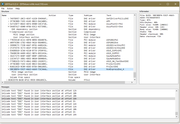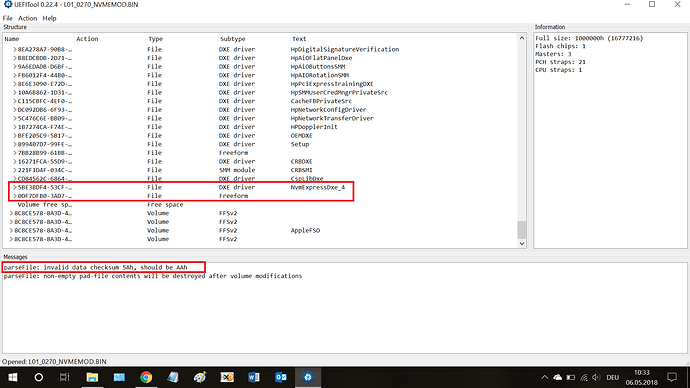It’s the same NvmExpressDxe_4 as I’m using in my own daily driver BIOS. 
I need your help. (My motherboard gigabyte GA-Z68AP-D3)
Did everything according to the instructions. Everything is working. But only 2nd slot Pci 3.0x4 works in 2.0x1 mode
It is on the modified BIOS, on the standard it works as it should.
What can be done?(
@ToN1k_i_am :
1. Did you follow my advice and contacted the Gigabyte Technical Support? If yes, which reply did you get?
2. Are you using a discrete Graphics card? If yes, did you try to remove it temporarily?
3. Did you try all other available PCI slots?
Gygabyte teh support:
I have PCIe x16 and PCIe x4. But PCIe x4 slot works like PCIe x1.
Look at the screenshot
My videocard works corrently in PCIe 3.0 x16.
If i put videocard in PCI x4, it will write: PCI Express 2.0 x1
But i need to PCIe 2.0 x4 almost
With my ssd the same story.
I cant use videocard and ssd at 100%
In the BIOS, changing the PEG setting -
GEN X (1,2,3) does not change anything. I tried everything I could. First time I’m writing to tech support.
I really hope for your help.
Question 2:
There are 2 devices in the computer - SSD disk and video card.
All other pci slots are empty. But, SSD nvme m.2 with adapter for PCIe.
This disk is not supported by your obsolete bios, so the nvme support module was implemented in the official beta firmware.
Could this be the reason?
Either the problem is more mechanical in nature (degradation / damage to the north or south bridges, or the contact in the connector itself)? 02/27/2018 7:17 PM
Answer:
"Could this be the reason?"
In all likelihood, this is the reason for the x4 slot in x1 mode.
"Either the problem is more mechanical in nature (degradation / damage to the north or south bridges, or the contact in the connector itself)?"
You can assume a lot of things, but any BIOS customization can cause the board to work incorrectly.
Product Name: GA-Z68AP-D3 (2.0)
BIOS Ver: UA9 (UEFI BIOS) (Z68APD32.Ua9)
Brand: other - Palit
Model: intel i5 3470
Operating System: Win 10 64-bit
Brand: Transcend
Memory Part No .: PSD34G160081
- Yes, those support said: The problem is in the modified BIOS.
2. Yes, the video card is discrete. I did not connect without video card, I’ll try it this evening, I’ll write.
3. There are 2 PCIe 3.0 slots, and only x16 works as it should.
PCIe 3.0 x4 works in PCIe 2.0 x1 mode. (this is the problem)
The remaining PCIe x1 slots work fine.
4. When an SSD is inserted in PCIe 3.0 x4, it works as 2.0 x1 and is not always visible at boot time. The computer needs to be rebooted many times (usually 3-5 times) until it is lucky, then it boots and works without problems (in 2.0x1 mode).
5. When I inserted the Wi-Fi + bluetooth module into the PCIe x1, the computer started to run even less often, 10-20 restarts, so that the system sees the SSD.
6. If you insert a video card in PCI 3.0 x4, it is always defined, but it works slowly (2.0 x1) …
I really hope for your help, you are the only one in the world who can help me =)))
@ToN1k_i_am :
Thanks for your quick and detailed answers.
As first step you should test the PCIe slots after the temporarily removal of your discrete graphics card.
If the problem should still persist or if you absolutely need the discrete graphics card, I recommend to replace the inserted NVMe module by the new NvmExpressDxe_4 one. Maybe it contains an optimization for your specific PCIe connection.
Good luck!
NvmExpressDxe_4 installed, no changes …
I’ll try without a video card, I’ll write it.
I do not want to use other methods, because this is more correct.
Hello dear friend)
Everything begins to clear up, modification of the BIOS is not the reason.
On the standard BIOS firmware, when loading the Windows from a flash drive, the video card inserted in PCIe 3.0 x4 still works in 2.0 x1 mode …
The problem is still in the motherboard, I’ll knock on technical support, thank you, sorry for bothering me)
Tonight I’ll try to use SSD and built-in video card, but I think I’ll see the same result.
@ToN1k_i_am :
Thanks for your interesting report and for having done the required tests to find out the reason for your PCIe connection issues.
Very important for the users of this thread was your conclusion, that your problems have nothing to do with the BIOS modification.
Thanks again!
With the built-in video card the same situation. Waiting answer from technical support.
Thanks a lot)
Hi,
Could someone please modd mine, I would be very grateful ![]()
v2103
http://www.station-drivers.com/index.php…mid=169&lang=en
@TJJ :
You should do the modification yourself. It is very easy.
If you are unsure regarding the result of your work, you can attach it. Then I will have a look into the modded BIOS and let you know, whether it seems to be well done.
Ok, it wasn’t so hard. Thanks,
I checked after and it was like so, so Im all set? ![]()

Edit: thanks again.
I’m curious, was anyone able to run some benchmarks on a P67 or Z68 with some of the fancy stuff? I’m debating if I should buy the Samsung Evo 960 / 970, or the Optane 800p / 900p, but the fact the Sandy Bridge only allows PCIE 2.0 might degrade the performance too much. Thoughts?
For comparison, I’m currently running an EVO 850, which is adequate, but if I can squeeze a bit more of performance out of my i5-2500k before upgrading, that would be awesome ![]()
@legatinho :
Welcome to the Win-RAID Forum!
You can find my benchmark test results on a P68 within the start post of this thread (chapter “This is what you hopefully will get:”).
If I were you, I would buy a good value 250 GB NVMe SSD like the Samsung EVO 960/970 SSD and use it as your new system drive, but you should not expect a remarkable performance boost while doing your daily work (unless you are processing extremely big sized files).
Regards
Dieter (alias Fernando)
Dear Fernando, hello.
I have been visiting your page a lot lately, reading your post. I have got an HP EliteDesk 800 G1. Recently, I bought an NVME SSD Kingston : https://www.amazon.it/Kingston-KC1000-So…+PCIe+NVMe+HHHL
I could install Windows 10 into it without any issues. Sadly, I can’t boot from it, and for now i’m using the clover usb bootloader method.
Following your instructions, I already updated to my latest bios available (L01 02.70 based on HP website for my exact model), then I modded the very same .bin bios image file and added the latest NVME modules. Could you please check if the file is correct? You can find it here: https://mega.nz/#!iBEgWIbD!DW91wv0B_O6Tw…g84RKX8uEtqP9uM
I tried already to flash this file from BIOS \ Flash System Rom, but it told me almost immediately ‘Error Flashing System Rom’ without any consequential harm. Could you please help me out?
My system BIOS:
https://www.youtube.com/watch?v=Sf4DfLTw-yI
Weird thing is that HP told me that I was good to go with it given I had NIC options in the BIOS: Link here. Don’t know why it redirects.
Simply my BIOS cannot see the KC1000 as booting device.
Thanks for all you have done.
@ChronoPhoenix :
Welcome to the Win-RAID Forum!
As you can see within this screenshot, there seems to be something wrong with your uploaded modded BIOS (wrong checksum, inserted DXE module is not at the undermost position of the DXE Driver Volume):
For a comparison please upload the original BIOS file, which has been used as source.
The BIOS will never show the KC1000, but nevertheless will be able to boot off it, if you have done everything correctly. Once the OS Win10 and the related EFI bootloader has been installed onto the NVMe SSD, it will be shown within the BIOS as “Windows Boot Manager”.
Regards
Dieter (alias Fernando)
Dear Fernando,
many thanks for your prompt reply.
Please find the original BIOS here: https://mega.nz/#!bV1xnSBb!DbC4roV_d6Mtm…ElOgCXz7LbqdPEg It’s downloaded directly from HP support.
Weird, I thought I selected the very last DXE I have found. Please, in case could you patch it for myself? And tell me if you find the mistake?
I thank you… and sorry for the troubles.
@ChronoPhoenix :
This evening I will do a look into both BIOS files and try to find out what may be done wrong, but I will not do the BIOS modification for you. If I would start doing the BIOS modding upon request, too many Forum members/guests would ask for this kind of help.

